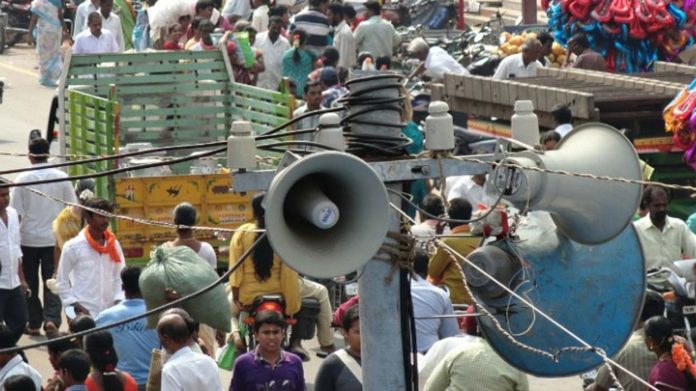Ogun And Its Fight Against Noise Pollution
By Ademola Orunbon
Sound turns to noise when it is unpleasant or harmful to the ears. Attention is not usually given to noise pollution as compared to air and water pollutions. In some parts of Nigeria, particularly, cities and major towns, noise is regarded as an indication that those areas are developed. That an urban area is characterized by its busy day-to-day economic and social activities, does not necessarily translate to a noisy city as believed by many. True, and to a large extent, city life is a noisy life.
Some drivers have become addicted to honking their horns needlessly and unnecessarily, especially among the motorcyclists (okada riders). They honk to greet or exchange pleasantries; they honk to call someone; they honk to hurry traffic personnel to let them pass; they even honk to hurry vehicles ahead of them at signalized junctions where traffic lights are stationed. But drivers, motorcyclists, commercial or private, are duty-bound to be quiet on the road.
Today, honking in Ogun state has not only become an environmental issue but also a public health challenge as well. The transportation sector, entertainment industry and predominantly, religious worship centres scattered everywhere are, unarguably the main sources of noise pollution. In fact, a report in January had it that, 60% of noise pollution in Ogun State is caused by worship centres.
According to the agency in Ogun saddled with the responsibility of protecting the environment, Ogun State Environmental Protection Agency (OGEPA), noise pollution has two main effects: auditory and non-auditory. The auditory effects of noise are deafness and auditory fatigue; the non-auditory effects are annoyance, mental illness, disturbance, stress, loss of work efficiency, interference in speech communication and physical disorder like, increase in heartbeats or blood pressure.
One may not even suspect or feel any discomfort until serious damage is done to the ears and a hearing test would have to be conducted for confirmation of damage extent. It happens so because the auditory effect of noise pollution on the body is that it kills slowly and silently.
At a recent sensitization program on the dangers of noise pollution organized by OGEPA at Sango-Ota, the Senior Special Assistant to the Governor on Environment, Hon. Farouk Akintunde, warned religious organization and relaxation centres to desist from any act that could cause noise pollution within the environment, admonished that any erring organization or relaxation centres will be sanctioned.
Due to the importance of a noiseless environment, a day should be set aside in Ogun where all drivers are not expected to honk. It should be tagged “Ogun horn-free day”, like it usually observes in Lagos, which comes up on October 15 every year, this will indeed creates massive awareness on the need to achieve a noise-free Ogun too. That ‘Ogun No Horn Day’ should be initiated by the government, and it will help serve as reminders to drivers annually on the need to control noise while on the road. Many drivers are really keen on honking their horns unnecessarily.
Likewise too, all illegal parks and garages which constitute nuisance and noise pollution should be scraped, while going to Olomore/Ita-Osin, there were several garages, illegally mounted its microphones at the both sides of the road, which also contributes to the slow movement of vehicles, there is also a stationary motor in front of St-Peters Secondary School, selling those herbal mixtures which constitute noise threat to the school teachers and the learners itself. The government has to find a lasting solution to the noise pollution in the State.
Constant exposure to noise pollution is the reason life expectancy is short and longevity isn’t guaranteed in urban areas. In fact most people prefer to retire in the villages in their twilight years. Old folks in the villages do not only live long, they hear clearly and soundly lifelong because their ears are far from noise. This is a pointer to the fact that a noisy environment negatively impacts lifespans.
Noise pollution is easier to control when compared to air and water. Whatever source produces noise was not originally meant to do so; it was invented to make life easier. Household gadgets, equipment, machines or any other mechanical or electrical devices used outdoors are all designed to bring ease to human activities. However, they have turned to be sources of disturbances due to abuse or misuse.
A noiseless or quiet environment brings full concentration with increased productivity at work, stress relief, good health, happiness, improved intelligence and self-confidence.
Noise production is not natural, it is man-made and as such, it is controllable. We can therefore determine the noise level we want ourselves by the way we live. If everyone knows how injurious and dangerous noise pollution is to our health, then they will take noise control seriously. Neighbours of religious worship centres, club houses or hotels where noise pollution takes place are at liberty to make a formal complaint to OGEPA. Such complaints when treated and eventually resolved will help residents in the neighbourhood live in better health. OGEPA should bring standards for ambient noise levels stipulate to 50, 60 and 70 decibels of sound level respectively for residential, commercial and industrial areas at day time; and at night time, 40, 55 and 65 decibels in that same order.
A popular noise pollution slogan summarizes the dangers inherent in noise thus; noise can fill your ears, and put you in tears. One good way to save and care for our ears indoors or outdoors is to avoid loud sound–noise. Regular hearing test as means of check-up is also recommended for the ears. Everyone should also respect the right of people around when their sound is causing disturbance or creating nuisance. Our society becomes saner when the environment is noiseless. Achieving a noiseless Ogun is a collective responsibility of all residents as health and environmental challenges occasioned by noise pollution will be greatly mitigated. Let’s keep the noise down or else, the noise will keep us down.





